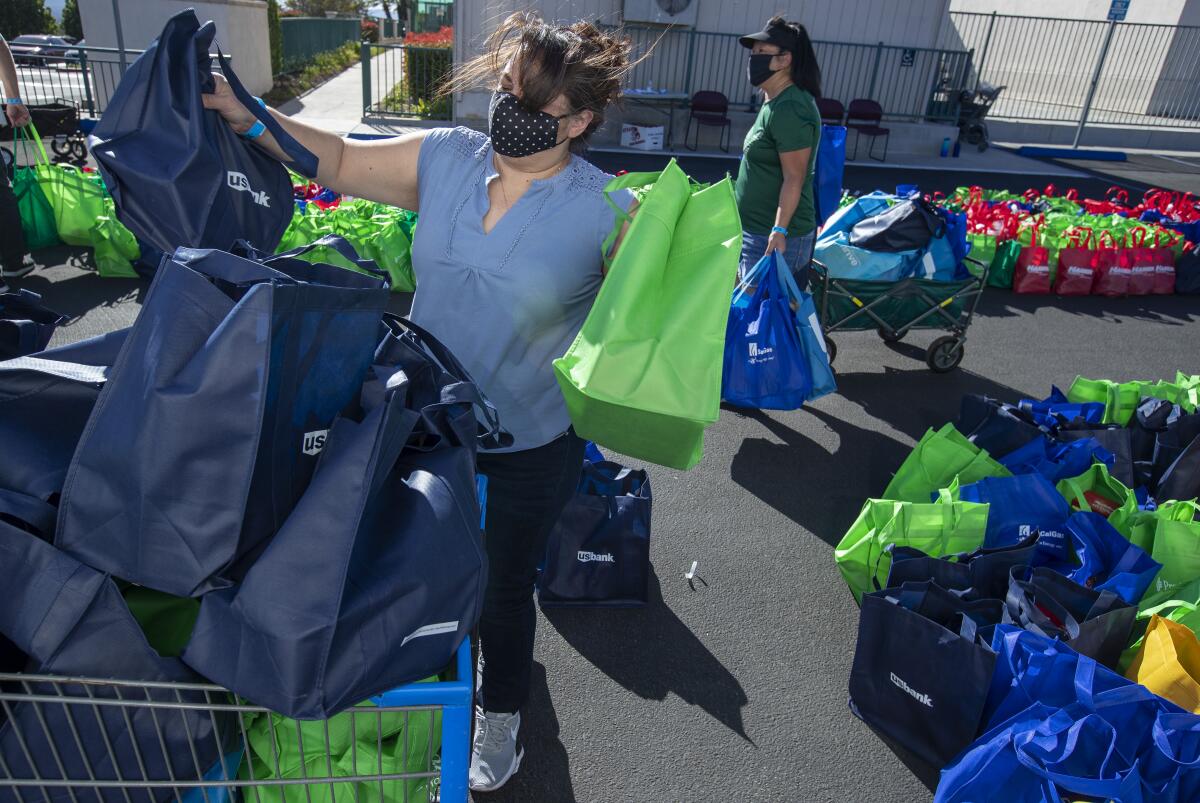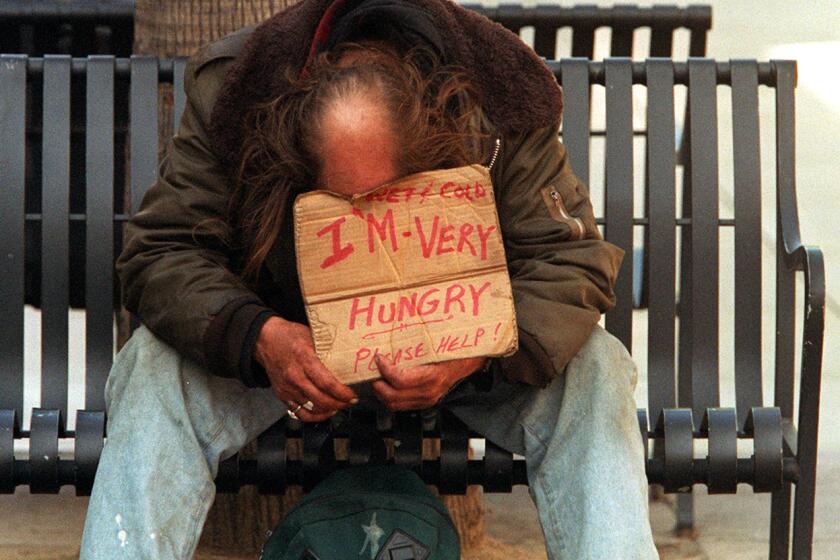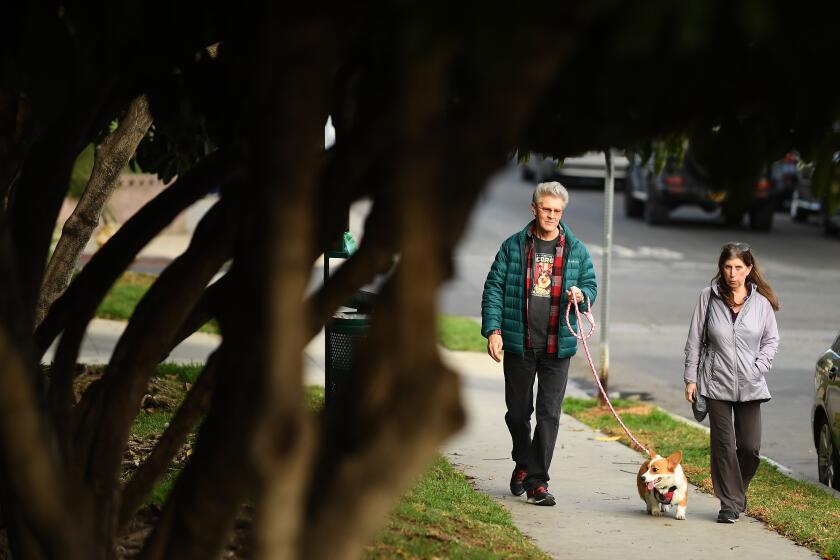My inbox overflows with tributes to great L.A. helpers

- Share via
They have checked up on their older neighbors every day during the pandemic. They have gone out on the streets to offer people living on them food and empathy.
They have taught online all week long and then on the weekends cooked casseroles to deliver to the families of students they fear might not have enough to eat.
When they’ve lost their jobs or had their hours cut or had to shut their businesses during the pandemic, they’ve used this new unwished-for free time to look around and say, Sure I’m hurting, but how can I help those hurting more?
In the two weeks since I asked you to tell me about those in Los Angeles who do great good for others, hundreds of your emails and messages and texts have flooded both my heart and my inboxes.
I have read enough stories about good people going to great lengths to do good to begin to restore even the most cynical person’s faith in humanity.
They have arrived from all over the city and the county and across Southern California. They have highlighted the altruism of individuals age 9 to 96.
Do you know someone in Los Angeles who does great good for others? This columnist is looking to talk to people about how they started helping and what they’ve learned from experience.
Many are about people who have never sought publicity or recognition for their extraordinarily generous efforts. They come with caveats: “She doesn’t know I’ve written to you,” “I don’t know that he’d want me to tell you this.”
Mothers have secretly slipped me information on their daughters. Husbands have crowed about their wives. People have written to me about strangers they know only from a distance — through their concerted campaigns on social media or in neighborhood chat rooms to get help for the neediest around them.
They have told me about people who don’t shrug their shoulders at others’ woes or look away but think, What can I do? What gaps can I fill? What skills and resources do I have that can help?
One reader, for instance, wrote to me about Christine Barry of Long Beach, whose efforts to help those living on the streets she follows on Nextdoor.
Barry, Kim Proffitt told me, “takes on homeless cases as she sees them, finding immediate fixes like housing for young mothers with children while also helping them navigate the bewildering process of getting help from all the different agencies. She also tackles long-term projects, gradually approaching tough cases that seem dire, establishing trust and then getting individuals into treatment or reuniting them with family.”
In describing Barry’s style, Proffitt articulated a certain mindset that many of those you’ve been telling me about seem to have in common. They are doers. When they see a tough problem, they don’t assume either that it’s someone else’s to deal with or that it’s too big for them to make a difference. They jump right in and begin chipping away at it.
“It reminds me of the saying, How do you eat an elephant? One bite at a time,” Proffitt wrote.
A man with a PhD lost his six-figure job and became homeless. He asked strangers to foster his dog. When his story was told, help poured in and gave him what he needed to get back on his feet.
Taking individual action is one thing. Activating others to take action is another. Many of the emails I’ve received about great helpers have stressed their ability to mobilize everyone around them. Those who have been mobilized say they are thankful to know people who take leadership and offer them clear ways to contribute.
Sari Scheer wrote to me about how her friend Patty Shinozaki of Santa Clarita runs a business selling kitchen tools but also regularly makes blankets for children in need, puts together meals for a local shelter and raises money for the American Cancer Society.
“What makes Patty amazing is that she is phenomenal in engaging others in her projects. She sends out an email with the date of her shelter meals and lets people know what she needs to make the meals. Can you pick up some bread? Do you have canned tomatoes?” Scheer wrote. “Not only is she giving to others who are less fortunate but she is helping those of us who are lucky enough to have enough participate in the giving.”
Kirsten Rosenberg wrote to me of a woman named Robyn Yacoub, who recruited others during the Bobcat fire to help her get displaced families in the hard-hit Juniper Hills community into temporary homes stocked with all the essentials they’d lost in the flames but would need. “She inspires others to join her in making a difference,” Rosenberg wrote.
I’ve been told about many projects that started very small but — pushed by the passion of their creators — caught hold and quickly grew very big. Many readers wrote, for instance, to tell me about a woman who offered to sew a mask for anyone who needed one at the start of the pandemic, when she was furious at the federal government’s failure to provide adequate PPE to protect front-line workers and those who were most vulnerable. She built what began as a solo effort in her Koreatown apartment into a national network of volunteers that has now produced not just hundreds of thousands of masks but a tight-knit and supportive community that has turned many of its members into activists.
In the coming months, I plan to tell you this story along with others that I think might inspire, and provide useful models for, the rest of us.
Models for lending a hand. Models for building community. Models for coming together to make our world more compassionate, more resilient and better.
More to Read
Sign up for Essential California
The most important California stories and recommendations in your inbox every morning.
You may occasionally receive promotional content from the Los Angeles Times.












